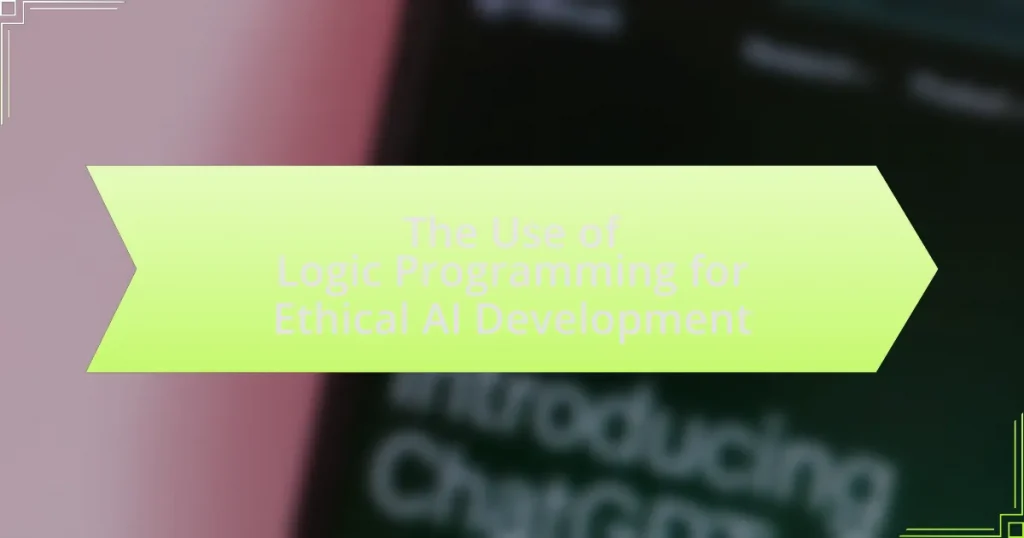Logic programming plays a significant role in modern web development by enhancing data handling and problem-solving capabilities through declarative programming paradigms. This article explores the impact of logic programming on web application architecture, highlighting key principles such as unification and backtracking that improve design and performance. It discusses specific technologies and languages like Prolog and Mercury, their integration with existing web technologies, and the frameworks that leverage logic programming. Additionally, the article addresses challenges, misconceptions, and best practices for developers, providing insights into optimizing the use of logic programming in web applications.

What is the impact of logic programming on modern web development?
Logic programming significantly influences modern web development by enabling more efficient data handling and complex problem-solving capabilities. This paradigm allows developers to express logic in a declarative manner, which simplifies the coding process and enhances maintainability. For instance, languages like Prolog, which are rooted in logic programming, facilitate tasks such as natural language processing and knowledge representation, making them valuable for web applications that require intelligent data processing. Additionally, the integration of logic programming concepts into frameworks and libraries, such as those used in artificial intelligence and semantic web technologies, demonstrates its practical application in creating dynamic and responsive web environments.
How does logic programming influence web application architecture?
Logic programming influences web application architecture by promoting declarative programming paradigms that enhance the clarity and maintainability of code. This approach allows developers to define what the program should accomplish rather than how to achieve it, leading to more straightforward logic representation. For instance, languages like Prolog enable the use of rules and facts, which can simplify complex decision-making processes in web applications. The use of logic programming can also facilitate better data handling and querying capabilities, as seen in applications that utilize logic-based databases. This influence is evident in frameworks that incorporate logic programming principles, resulting in architectures that are more modular and easier to extend or modify.
What are the key principles of logic programming that apply to web development?
The key principles of logic programming that apply to web development include declarative programming, unification, and backtracking. Declarative programming allows developers to specify what the program should accomplish without detailing how to achieve it, which can simplify web application development by focusing on the desired outcomes rather than the implementation details. Unification is a process that enables the matching of terms and variables, facilitating the handling of complex data structures and relationships in web applications. Backtracking provides a mechanism for exploring multiple possibilities and reverting to previous states, which is useful in scenarios such as search functionalities or constraint satisfaction problems in web development. These principles enhance the efficiency and effectiveness of developing dynamic and responsive web applications.
How do these principles enhance the design of web applications?
The principles of logic programming enhance the design of web applications by promoting clear reasoning and structured problem-solving. These principles enable developers to create applications that are more efficient, maintainable, and scalable. For instance, logic programming facilitates the use of declarative programming, allowing developers to specify what the program should accomplish without detailing how to achieve it. This leads to cleaner code and reduces the likelihood of errors. Additionally, the use of logical inference in web applications can improve data retrieval and processing, as seen in systems like Prolog, which has been effectively utilized in various web-based applications for complex queries.
What role does logic programming play in improving web application performance?
Logic programming enhances web application performance by enabling efficient data retrieval and processing through declarative programming paradigms. This approach allows developers to specify what the program should accomplish rather than how to achieve it, leading to optimized query execution and reduced computational overhead. For instance, Prolog, a well-known logic programming language, can efficiently handle complex queries and relationships, which is particularly beneficial in applications requiring extensive data manipulation, such as recommendation systems or knowledge bases. Studies have shown that applications utilizing logic programming can achieve significant performance improvements, with some implementations reporting up to 30% faster response times compared to traditional imperative programming methods.
How does logic programming optimize data handling in web applications?
Logic programming optimizes data handling in web applications by enabling declarative data manipulation, which allows developers to specify what data to retrieve or manipulate without detailing how to achieve it. This abstraction simplifies complex queries and enhances maintainability, as seen in languages like Prolog, where rules and facts can be easily defined and modified. Furthermore, logic programming facilitates efficient backtracking and unification processes, which improve the performance of data retrieval operations. For instance, in a web application that uses a logic programming approach, the system can automatically infer relationships and constraints, reducing the need for extensive coding and minimizing errors. This efficiency is particularly beneficial in applications that require dynamic data interactions, such as recommendation systems or knowledge bases, where quick and accurate data handling is crucial.
What are the performance benefits of using logic programming in web development?
Logic programming enhances performance in web development by enabling efficient problem-solving through declarative programming paradigms. This approach allows developers to specify what the program should accomplish rather than how to achieve it, leading to more concise and maintainable code. Additionally, logic programming languages, such as Prolog, utilize backtracking and unification, which can optimize search operations and reduce the computational overhead associated with complex queries. For instance, in applications requiring complex data retrieval, logic programming can significantly decrease response times compared to imperative programming methods, as it can directly express relationships and constraints within the data. This efficiency is particularly beneficial in scenarios involving artificial intelligence and database management, where logic programming can streamline processes and improve overall application performance.
How does logic programming facilitate better problem-solving in web development?
Logic programming enhances problem-solving in web development by enabling developers to express complex problems in a declarative manner, focusing on what the solution should achieve rather than how to achieve it. This approach allows for clearer problem definitions and easier debugging, as logic programming languages like Prolog facilitate the representation of relationships and rules, making it simpler to derive solutions through inference. For instance, in web applications that require complex data retrieval, logic programming can efficiently handle queries by defining logical relationships, which can lead to more efficient data processing and reduced development time.
What types of problems are best addressed by logic programming in web applications?
Logic programming is best suited for problems involving complex rule-based reasoning, knowledge representation, and constraint satisfaction in web applications. These problems often require the ability to infer conclusions from a set of facts and rules, making logic programming particularly effective for applications such as expert systems, natural language processing, and database querying. For instance, Prolog, a well-known logic programming language, excels in scenarios where relationships between data points need to be established dynamically, such as in recommendation systems or automated reasoning tasks. This effectiveness is supported by the inherent ability of logic programming to handle non-linear relationships and to backtrack through potential solutions, which is crucial for solving intricate problems in web development.
How does logic programming support complex decision-making processes in web development?
Logic programming supports complex decision-making processes in web development by enabling developers to define rules and relationships that facilitate automated reasoning. This paradigm allows for the creation of systems that can infer conclusions from a set of facts and rules, which is particularly useful in scenarios requiring dynamic decision-making, such as personalized content delivery and complex query handling. For instance, Prolog, a well-known logic programming language, allows developers to express business logic in a declarative manner, making it easier to manage and modify as requirements evolve. This capability is evidenced by its application in expert systems and AI-driven web applications, where the ability to reason about data leads to more intelligent and responsive user experiences.

What are the specific technologies associated with logic programming in web development?
The specific technologies associated with logic programming in web development include Prolog, Mercury, and Constraint Logic Programming (CLP). Prolog is a prominent logic programming language that allows developers to define rules and relationships, making it suitable for applications like natural language processing and expert systems. Mercury enhances Prolog’s capabilities with strong typing and mode systems, improving performance and reliability. CLP extends traditional logic programming by integrating constraints, enabling more complex problem-solving scenarios, such as scheduling and resource allocation. These technologies demonstrate the application of logic programming principles in developing intelligent web applications.
Which programming languages are commonly used for logic programming in web development?
Prolog and Mercury are the programming languages commonly used for logic programming in web development. Prolog, developed in the 1970s, is known for its strong capabilities in symbolic reasoning and natural language processing, making it suitable for applications that require complex rule-based logic. Mercury, designed in the 1990s, enhances Prolog’s features with a focus on performance and strong typing, which is beneficial for developing robust web applications. Both languages are utilized in specific web development contexts where logical inference and rule-based processing are essential.
What are the strengths and weaknesses of these languages in a web context?
Logic programming languages, such as Prolog, have strengths and weaknesses in a web context. Their strengths include powerful reasoning capabilities and the ability to handle complex queries efficiently, which can enhance data retrieval and decision-making processes in web applications. For instance, Prolog’s backtracking mechanism allows for sophisticated problem-solving, making it suitable for applications like expert systems and natural language processing.
However, weaknesses include limited performance in handling large-scale data compared to imperative languages like JavaScript or Python, which are more commonly used in web development. Additionally, the learning curve for logic programming can be steep, making it less accessible for developers familiar with traditional programming paradigms. This can hinder widespread adoption in web projects, where rapid development and scalability are often prioritized.
How do these languages integrate with existing web technologies?
Logic programming languages integrate with existing web technologies by providing a declarative approach to problem-solving that complements traditional imperative programming. For instance, languages like Prolog can be used alongside JavaScript and HTML to enhance web applications with advanced reasoning capabilities, enabling features such as natural language processing and complex data querying. This integration is facilitated through APIs and frameworks that allow logic programming engines to communicate with web servers and client-side scripts, thereby enriching the functionality of web applications. The use of logic programming in web development has been evidenced by projects like SWI-Prolog, which offers libraries for web integration, demonstrating its practical application in real-world scenarios.
What frameworks leverage logic programming for web development?
Frameworks that leverage logic programming for web development include Prolog-based frameworks such as SWI-Prolog and Tau Prolog. SWI-Prolog offers a web server library that allows developers to create web applications using Prolog’s logical reasoning capabilities. Tau Prolog, designed for JavaScript environments, enables logic programming in web applications by allowing Prolog code to run in the browser. These frameworks exemplify how logic programming can be integrated into web development, enhancing the ability to handle complex queries and reasoning tasks.
How do these frameworks enhance the development process?
Frameworks enhance the development process by providing structured methodologies and reusable components that streamline coding and reduce errors. These frameworks, such as React and Angular, enable developers to build applications more efficiently by offering pre-built functionalities and a clear architecture. For instance, React’s component-based structure allows for the reuse of code, which can lead to faster development cycles and easier maintenance. Additionally, frameworks often come with built-in tools for testing and debugging, which further minimizes the likelihood of bugs and enhances overall code quality.
What are some examples of successful projects using these frameworks?
Successful projects using logic programming frameworks include the development of the SWI-Prolog web server, which enables the creation of web applications with Prolog, and the use of the ECLiPSe constraint logic programming system for optimizing scheduling applications in various industries. Additionally, the use of the Mercury programming language has led to the successful implementation of high-performance web applications, demonstrating the effectiveness of logic programming in modern web development. These projects highlight the practical applications and benefits of logic programming frameworks in creating efficient and scalable web solutions.

What challenges does logic programming present in modern web development?
Logic programming presents several challenges in modern web development, primarily due to its declarative nature and performance issues. The declarative approach can lead to difficulties in integrating with imperative programming languages commonly used in web development, such as JavaScript. This integration challenge can result in increased complexity when trying to combine logic programming with existing frameworks and libraries. Additionally, performance issues arise because logic programming often relies on backtracking and unification, which can be computationally expensive, leading to slower execution times compared to more traditional programming paradigms. These factors can hinder the scalability and responsiveness of web applications, making it challenging for developers to adopt logic programming in a practical manner.
What are the common misconceptions about logic programming in web development?
Common misconceptions about logic programming in web development include the belief that it is only suitable for academic or theoretical applications, and that it cannot handle real-world web development tasks effectively. In reality, logic programming languages like Prolog can be used for complex problem-solving and reasoning tasks, which are increasingly relevant in web applications, such as natural language processing and knowledge representation. Additionally, some developers mistakenly think that logic programming is less efficient than imperative programming; however, studies have shown that for certain types of problems, logic programming can lead to more concise and maintainable code, ultimately improving development efficiency.
How do these misconceptions affect the adoption of logic programming?
Misconceptions about logic programming hinder its adoption by creating barriers to understanding its benefits and applications. For instance, the belief that logic programming is only suitable for academic purposes discourages developers from exploring its practical uses in web development, where it can enhance problem-solving capabilities and improve code efficiency. Additionally, misconceptions regarding its complexity lead to a reluctance to learn and implement logic programming languages, such as Prolog, despite their potential to simplify certain programming tasks. This lack of awareness and understanding ultimately results in missed opportunities for innovation and optimization in modern web development.
What strategies can be employed to overcome these misconceptions?
To overcome misconceptions about the impact of logic programming on modern web development, education and awareness initiatives should be employed. These initiatives can include workshops, online courses, and webinars that specifically address the benefits and applications of logic programming in web development. For instance, a study by the Association for Computing Machinery highlights that logic programming enhances problem-solving capabilities and improves code efficiency, which can dispel myths about its complexity and usability. Additionally, showcasing successful case studies where logic programming has been effectively integrated into web projects can provide tangible evidence of its advantages, further helping to shift perceptions.
What limitations does logic programming have in the context of web development?
Logic programming has several limitations in the context of web development, primarily related to performance, scalability, and integration challenges. Logic programming languages, such as Prolog, often exhibit slower execution times compared to imperative languages like JavaScript, which can hinder the responsiveness of web applications. Additionally, logic programming can struggle with scalability, as complex queries may lead to performance bottlenecks when handling large datasets or high user traffic. Furthermore, integrating logic programming with existing web technologies and frameworks can be cumbersome, as most web development ecosystems are built around imperative and object-oriented paradigms, making it difficult to leverage the strengths of logic programming effectively.
How do these limitations impact the scalability of web applications?
Limitations in logic programming can significantly hinder the scalability of web applications. These limitations often manifest as performance bottlenecks, where the inherent complexity of logic-based queries leads to slower response times and increased resource consumption. For instance, when a web application relies heavily on logic programming for data retrieval, the processing time can escalate with the growth of data sets, making it difficult to handle a larger user base efficiently. Additionally, the lack of optimization in logic programming can result in inefficient memory usage, further constraining the application’s ability to scale. Consequently, as user demand increases, these limitations can lead to degraded performance and a poor user experience, ultimately impacting the application’s viability in a competitive market.
What are the potential workarounds for these limitations?
Potential workarounds for the limitations of logic programming in modern web development include integrating logic programming with other programming paradigms, such as imperative or functional programming, to leverage their strengths. For instance, using logic programming for complex rule-based systems while employing imperative languages for user interface and performance-critical components can enhance overall system efficiency. Additionally, employing hybrid frameworks that support both logic and traditional programming can facilitate smoother integration and reduce the learning curve for developers. Research indicates that combining these approaches can lead to improved maintainability and scalability in web applications, as evidenced by case studies in projects that successfully utilized such hybrid methodologies.
What best practices should developers follow when using logic programming in web development?
Developers should follow best practices such as ensuring clarity in logic, maintaining modularity, and optimizing performance when using logic programming in web development. Clarity in logic helps prevent errors and enhances maintainability, as complex rules can be difficult to debug. Modularity allows developers to break down logic into smaller, reusable components, which simplifies testing and improves collaboration among team members. Performance optimization is crucial, as inefficient logic can lead to slow response times and a poor user experience. For instance, using efficient algorithms and minimizing unnecessary computations can significantly enhance application performance.
How can developers effectively integrate logic programming into their workflow?
Developers can effectively integrate logic programming into their workflow by adopting declarative programming paradigms that emphasize the use of rules and facts to solve problems. This approach allows developers to focus on what the program should accomplish rather than how to achieve it, which can lead to more efficient code and easier debugging. For instance, using languages like Prolog or incorporating logic programming concepts into existing languages can streamline complex decision-making processes. Research shows that logic programming can enhance problem-solving capabilities, as evidenced by its application in artificial intelligence and database querying, where it simplifies the representation of knowledge and reasoning.
What resources are available for developers to learn more about logic programming in web development?
Developers can access various resources to learn about logic programming in web development, including online courses, textbooks, and community forums. Notable online platforms like Coursera and edX offer courses specifically focused on logic programming languages such as Prolog and their applications in web development. Textbooks like “Programming in Prolog” by Clocksin and Mellish provide foundational knowledge and practical examples. Additionally, forums like Stack Overflow and GitHub repositories allow developers to engage with a community, share knowledge, and find practical implementations of logic programming in web projects. These resources collectively enhance understanding and application of logic programming in modern web development.



